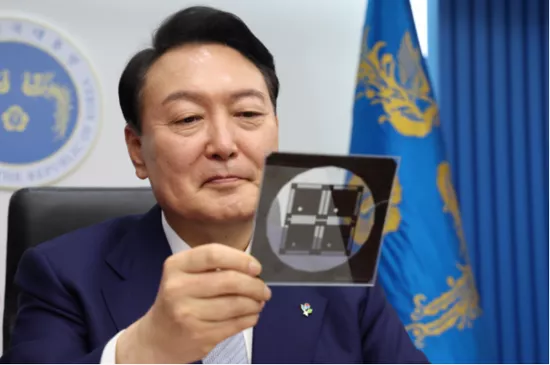Recently, at a cabinet meeting, South Korean President Yin Xiyue lashed out at vice minister of education Chang sang Wan. Before that, the latter had pointed out that the government was slow to respond to more and more calls for local universities to open more semiconductor related majors. According to the Korea economic daily, Yin Xiyue said at the meeting: "if the Ministry of education can not play a leading role in training talents needed by the Korean economy, it will be the Ministry of education itself that needs to be reformed."

At the urging of Yin Xiyue, the South Korean Ministry of education is looking for a solution to the shortage of high-quality semiconductor workers, which may include a substantial adjustment of rules and regulations. The move comes as the United States, Europe, Chinese Mainland and Taiwan, China are all increasing spending to develop the domestic chip industry.
The Korean semiconductor industry association said that in the next 10 years, the Korean semiconductor industry is expected to face a shortage of at least 30000 workers. During this period, about 1500 to 1600 new jobs will be created in the chip industry every year. However, there are only 650 fresh graduates of semiconductor or semiconductor related majors in Korea each year, less than half of that number.
In an interview with the Korea Economic Daily on the 9th, a relevant person from the Ministry of Education said: "in addition to opening employment related majors in universities, various plans to expand (semiconductor related) enrollment quota are being studied."
But this is not as simple as it seems. "Changing the way of thinking" will be strongly opposed by non capital circle members and politicians.
First of all, the student quota of universities in Seoul and Gyeonggi has always been the main obstacle to the increase of semiconductor related majors in local universities. South Korea began to implement this quota in 1994 to reduce the population density of the capital region. About half of South Korea's 50million people live in the capital region.
Universities may bypass the law by reducing the enrollment of other majors, especially non mainstream majors, to make room for semiconductor related majors. However, this proposal was strongly opposed by professors and alumni of relevant departments.
In addition, special standards can be formulated to give special preferential treatment to universities or semiconductor related departments to expand the enrollment. In other words, they may be excluded from the current population concentration mitigation law.
On the 9th, Premier Han chouzhu visited SK Hynix's main production base in Lichuan, Gyeonggi, and said: "the government will substantially increase the enrollment of universities in the capital region and other regions." To this end, the government is willing to provide financial assistance to academic institutions.
However, these plans must be approved by the Congress. In the next two years, Liberal Democrats who support balanced regional development will continue to occupy the majority of seats.
On the other hand, Seoul University has not agreed to set up a semiconductor major. Graduates of this major can work in sponsored enterprises such as Samsung Electronics and SK Hynix, and can also obtain scholarships and exempt entry and tuition fees. Most of the University's professors opposed the proposal on the grounds that the University was not a place to train skilled workers.
In addition, how to obtain the support of rural councillors is the most difficult problem. If universities in Seoul and surrounding areas increase their staffing quota, the number of students enrolled in other areas will be further reduced. With the decline of the birth rate, non Seoul universities are facing greater financial difficulties due to the reduction of enrollment. Therefore, members of parliament elected in rural areas are trying to prevent the passage of laws on increasing the number of students or opening semiconductor related majors in Universities in the capital region.
Former president Moon Jae-in's similar policies have not been supported by the Congress. The president of a private university in Seoul said: "in order to achieve this goal, universities in Seoul should reduce the total enrollment and ensure the number of semiconductor related majors." "Universities in other regions need to step back for the sake of national interests."
In order to cope with the shortage of manpower, the Korean government has decided to relax the selection criteria for universities that meet the conditions for setting up cutting-edge disciplines in order to reduce the number of students enrolled. This is the policy following the large-scale investment made by Samsung Electronics and SK Hynix in the next five years in order to maintain the dominant position in the semiconductor market.